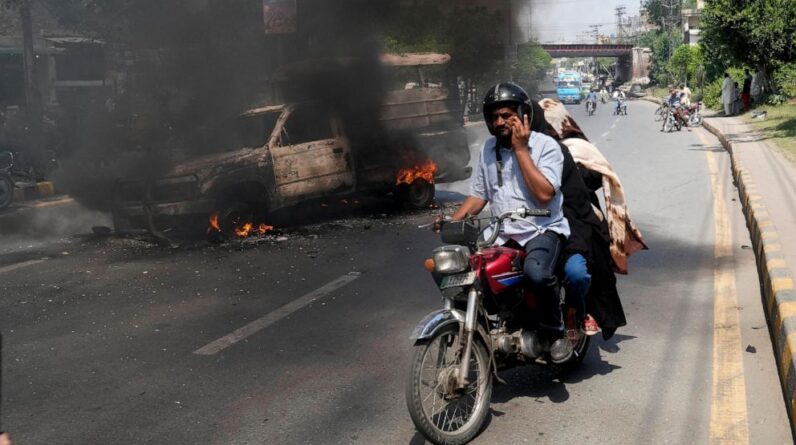
A leading international rights group and a Pakistani watchdog are calling on Pakistan not to try civilians involved in recent anti-government protests in military courts.
A motorist walks past a burning vehicle set on fire by angry supporters of former Pakistani Prime Minister Imran Khan in Lahore, Pakistan, Thursday, May 11, 2023. With Khan in custody, Pakistani authorities cracked down on his supporters and they arrested hundreds of people. in night raids and sending troops across the country to stem the wave of violence that followed his arrest earlier this week. (AP Photo/KM Chaudary)
The Associated Press
ISLAMABAD — A leading international rights group and a local body are calling on Pakistan not to try civilians involved in recent anti-government protests in military courts.
Amnesty International and the Human Rights Commission of Pakistan issued separate statements late Tuesday, saying they were alarmed by the government’s plan to prosecute supporters of former prime minister Imran Khan, who clashed with police and they rioted all over the country under military rule.
Military trials in Pakistan are often held behind closed doors, depriving civilians of some of their basic rights, including hiring a lawyer of their choice.
A wave of violence engulfed Pakistan’s capital and other urban areas after the dramatic arrest of Khan, now the opposition leader, from a courtroom in Islamabad on Tuesday last week.
Angry Khan’s supporters set fire to buildings and vehicles and attacked police and military personnel and installations. The clashes killed 10 people; authorities arrested 4,000. The Supreme Court later ordered Khan’s release and criticized the way he was arrested.
The Pakistani army and government later announced that they would prosecute “arsonists” involved in the violent protests under martial law.
Amnesty said it was “alarming to note” that the authorities have expressed their “intention to try civilians under military law, possibly in military courts”.
Dinushika Dissanayake, Amnesty’s deputy regional director for South Asia, said trying civilians in military courts is against international law.
Pakistan’s Human Rights Commission said arrested civilians should be tried in civilian, non-military courts, reserved for troops suspected of working against the country’s national interests and violating military rules.
Dissanayake accused the Pakistani government of using martial law as “an intimidation tactic, designed to suppress dissent by exercising fear of an institution that has never been held accountable for its reach.”
[ad_2]
Source link





